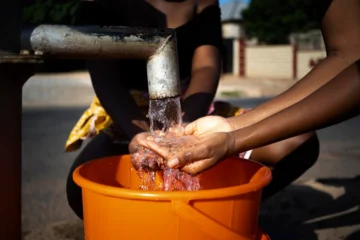Determining whether well water is hard or soft requires an understanding of the factors contributing to water hardness. Hard water arises when minerals, such as calcium and magnesium, bind to oxygen and hydrogen molecules.
Well water isn’t naturally hard, but it’s more likely to have minerals that make it hard because it comes from the ground, unlike water from specific reservoirs. Underground water, like well water, usually takes on the qualities of the nearby soil. This can result in an accumulation of excessive minerals, causing the water to become hard.
In this blog post, We will try to find the answer to our question and discover the reasons why water becomes hard and also give you recommendations.
Is Well Water Soft or Hard?
Well water is usually hard because it comes directly from the ground, gradually picking up minerals from the surrounding soil. Although well water can be soft, it’s safer to assume it’s hard until a thorough test confirms its composition.
On the other hand, city water, taken from sources like lakes and rivers, may initially have hardness. However, cities typically treat their water to remove hard minerals and impurities before distributing it to public use.
People using well water can use it without treatment, but for health reasons, it’s recommended to get it tested. This helps identify potential contaminants and determine if filtration, softening, or conditioning is needed to address any hard water problems.
Comparing Hard Well Water and Soft Well Water
1. Mineral Content
- Water naturally contains minerals.
- Hard water has a higher presence of calcium and magnesium minerals.
- Soft water lacks these minerals and soft water is beneficial for our health.
2. Taste Profiles
- Hard water has a chalky or chemical taste due to its high mineral content.
- Soft water provides a smoother, more neutral, or tasteless flavor.
- Softened hard water by a water softener may have a salty taste due to added sodium.
3. Texture of Water
- Hard water has a noticeable texture when consumed.
- Soft water provides a smoother drinking experience.
Benefits and Drawbacks of Soft Well Water
There are a few things to consider when it comes to the benefits of soft well water on health and the environment.
4 Benefits of Soft Well Water (Health & Environment)
While soft water can have some advantages, it’s important to be aware of the potential drawbacks as well.

1. Improved skin and hair health
Soft water can make it easier for soap and shampoo to lather, which can leave your skin and hair feeling softer and cleaner. This is because hard water minerals can react with soap to form scum, which can be irritating to the skin and scalp.
2. Reduced Cleaning Time and Effort
Soft water can make cleaning easier and more efficient. This is because soap scum and mineral buildup are less likely to occur in soft water. As a result, you may be able to use less soap and detergent, and you may find that your dishes, clothes, and surfaces are easier to clean.
3. Reduced Water Use
Soft water can help you save water in some cases. This is because soap and detergent are more effective in soft water, so you may be able to use less of them. Additionally, soft water can help to prevent scale buildup in appliances, which can improve their efficiency and lifespan.
4. Reduced Strain on Wastewater Treatment Plants
Soft water contains fewer minerals, which can make it easier for wastewater treatment plants to process. This can help to reduce the environmental impact of wastewater treatment.
2 Mian Drawbacks of Soft Well Water
1. Potential for Sodium Intake
Some water softeners use salt to regenerate the resin that removes minerals from the water. This can add sodium to the water, which can be a concern for people with certain health conditions, such as high blood pressure.
2. Altered Taste
Some people find that softened water has a slightly salty taste due to the increased sodium content. This altered taste may be undesirable for drinking or cooking purposes.
How to Identify Hard Well Water?
The definitive method to ascertain the hardness or softness of well water is through testing. However, certain signs can offer indications that the water from your well may be hard.

Here are the most prevalent signs to observe:
1. Unusual Water Taste
Hard water usually has a chemical or chalky taste, and you can feel a noticeable texture as you drink it.
2. Soap Loatheness
Extra minerals in hard water make it difficult for soap to lather as it should, making it harder to clean your body, clothes, and dishes effectively.
3. Low Water Pressure
Over time, minerals gather and create scale build-up in pipes and appliances, causing clogs that lower water pressure. Eventually, this build-up can lead to pipe bursts and affect the efficiency or functioning of appliances, indicating water hardness.
4. Soap Scum Residue
If you notice a white or grey film called soap scum on surfaces like skin, hair, showers, and sinks, it’s a common sign of hard water. After washing, you might feel that soap scum leaves your skin itchy and dry, and your hair may have more dandruff and become more prone to breakage.
5. Mineral Deposits
When hard water interacts with surfaces, it deposits small mineral particles known as lime scale, often seen as white spots on fixtures, dishes, and clothing.
Well Water Treatment (Water softening process)
Water purifiers use ion exchange to deal with problems caused by hard water minerals, which can lead to scale build-up and negative effects on the skin and hair.
In this process, when hard water enters the metal tank, it goes through a layer of round resin granules. These plastic granules, usually made of polystyrene, are loaded with sodium ions.
How Often Does Water Softener Change the Resin?
Many studies suggest that resin loss can be as much as 5% per year, leading to a 50% decrease in resin capacity after ten years of use.
Considering this, it’s usually best to replace water-hardness resin between 12 and 15 years for optimal performance.
Factors that Determine Well Water Hardness
Whether your well water is hard or soft depends on two main factors: where your well water comes from and the geological features of the well’s location.
1. Local Geology
Local geology refers to the different types of rocks in your area, and it significantly affects the hardness of well water. Sedimentary rocks such as sandstone, limestone, and shale contain water-soluble minerals that easily dissolve and get absorbed into water.
As water moves through layers of sedimentary rock, it picks up these minerals, making the water harder. So, if you live in an area with a lot of sedimentary rock, your well water is more likely to be hard.
On the other hand, areas with a significant amount of igneous rocks like granite are more likely to have soft water because they have lower mineral levels.
2. Water Source
The hardness of your well water is influenced by the source and, more specifically, the depth of your well. Generally, deeper wells tend to produce harder water because the water has to pass through multiple layers of rock and sediment to reach the underground aquifer. Along this journey, the water absorbs minerals like calcium and magnesium, making it harder.
On the other hand, shallow wells are more likely to have softer water since the water has a shorter path to the aquifer, with less time to accumulate minerals.
However, it’s crucial not to assume water hardness solely based on the well’s depth. A deep well may still have soft water, and a shallow well could have hard water.
The impact of local geology on water hardness highlights the importance of testing your water to accurately determine its hardness or softness.
Benefits of Using a Water Softener
You can enhance the flavor of your drinking water by utilizing a well-water softener. The softener system not only improves the taste of your drinking water but also.
- Enhance the flavor of ingredients mixed with water.
- Decrease the usage of soap and detergent.
- Prevent scale build-up in toilets, bathrooms, showers, clothing, and glassware.
- Avoid scale accumulation in pipelines, heating systems, plumbing fixtures, and other water-related appliances.
This can result in cost savings on maintenance and repairs while extending the lifespan of your household equipment.
Conclusion
The hardness of well water depends on factors like local geology and well depth. Even though well water isn’t naturally hard, drawing it directly from the ground can lead to mineral buildup, especially in areas with sedimentary rock.
Well, owners need to identify signs of hard water, such as an unusual taste, issues with soap lathering, and mineral deposits. Testing is the best way to determine water hardness.
Water softeners, which use ion exchange to reduce mineral content, can improve water quality, offering benefits like better taste, less soap usage, and prevention of scale build-up. Regular testing and appropriate treatment help maintain the longevity and efficiency of household equipment supplied by well water.
FAQs
How can I test if my well water is hard or soft?
You can test the hardness of well water using a water hardness test kit, which is readily available at hardware stores or online. Alternatively, you can contact a local water testing laboratory to analyze a sample of your well water for hardness and other parameters.
What are the effects of hard water on plumbing and appliances?
Hard water can lead to the buildup of mineral deposits, primarily calcium and magnesium, in pipes, faucets, and appliances like water heaters. Over time, this scale accumulation can reduce water flow, decrease the efficiency of water heaters, and potentially cause damage to appliances.
How does a water softener work for well water?
Water softeners use ion exchange to remove calcium and magnesium ions from well water, replacing them with sodium or potassium ions. The resin beads in the water softener attract and capture the hardness minerals, preventing them from causing scale buildup in plumbing and appliances.
Are there any health concerns associated with drinking hard well water?
Generally, hard water is safe to drink and doesn’t pose significant health risks. In fact, the minerals in hard water can contribute to your daily intake of essential minerals like calcium and magnesium.
Can I use a water softener for my well water?
Yes, water softeners are effective in treating well water for hardness issues. It’s essential to choose a water softener system that is suitable for the flow rate and hardness level of your well water. Regular maintenance and monitoring are also necessary to ensure optimal performance.





